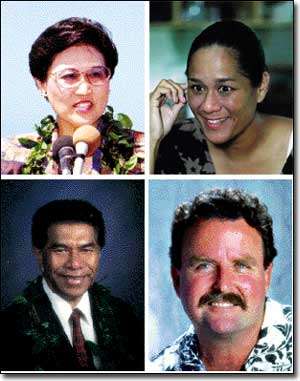Funding and reforming public-school education, and the continuing war on ice, or crystal methamphetamine, are priorities for Kaua’i’s state legislators for the 60-day session opening today, Wednesday, Jan. 21, they said. “Education has always been the big issue,” said state
Funding and reforming public-school education, and the continuing war on ice, or crystal methamphetamine, are priorities for Kaua’i’s state legislators for the 60-day session opening today, Wednesday, Jan. 21, they said.
“Education has always been the big issue,” said state Rep. Bertha C. Kawakami, D-west Kaua’i-Ni’ihau, a life-long educator before becoming a lawmaker.
“I always put that as my first choice,” said Kawakami, who favors a student-weighted formula that will use, among other criteria, numbers of special-education and gifted and talented students in each school to determine each school’s per-student funding level.
Teacher salaries will be another issue, she said. “We want to have good teachers. We think they ought to have a higher level of pay.”
State Rep. Hermina Morita, D-Hanalei-Kapa’a, said she felt educational reform will be one of the top issues of the 2004 session.
“In any session, education is always the number-one priority,” said state Rep. Ezra Kanoho, D-Lihu’e-Koloa. “This session, (it will be an issue) even more, because of differences on how to get there.”
While Republican Gov. Linda Lingle will push for regional school boards instead of the single statewide state Board of Education that now exists, the state Legislature’s ruling Democrats oppose creation of regional school boards, Kanoho said.
“It’s not the school boards. That alone is not going to do it,” Kanoho said. “There are things that can happen without establishing local school boards.”
Kawakami agreed. “I’m not for it,” she said of a proposal to have seven district school boards. “That’s not my bag.”
When she was with the DOE, one of her assignments was as complex manager for Westside schools, charged with making sure students have the skills needed to move on to the next grade, she said.
With help from the principals, student test scores and grades went up, and parents knew what their children were doing in classes, she said, supporting a complex-based management system instead of local school boards.
Establishing seven school boards would require the need for funding for seven school boards, said Kawakami in another reason for her opposition.
“I think there’s no question that supporting public education is going to be a top priority,” said state Sen. Gary Hooser, D-Kaua’i-Ni’ihau.
With common themes emerging from both the ruling Democrats in the state Legislature and Republican Lingle, “We can come up with a package of legislation to help public schools,” Hooser said.
Bills are expected to be introduced as early as today to get more money into the hands of school-level leaders; support principals through additional professional development; financially reward exceptional teachers; and reduce bureaucracy by allowing state Department of Education officials to make public-school decisions faster and easier, Hooser said.
Now, some public-school decisions need approval from leaders of various state departments other than the DOE, including the departments of health, human resources, accounting and general services.
“I think there will be a major push to reduce some of that bureaucracy,” Hooser said.
Regarding the battle against ice, Hooser said bills will be introduced to increase penalties for dealers and manufacturers of ice, or crystal methamphetamine, and in support of prevention and treatment programs.
Capital-improvement projects may include drug-treatment facilities and various school improvements, Hooser added.
Money will be available for items the state Legislature and Lingle feel are priorities, said Hooser.
“It won’t be easy to find money, and we won’t find money for all projects, but significant progress will be made on priority items this session,” Hooser predicted.
Morita said she will support a request for $1.6 million from Kaua’i Mayor Bryan J. Baptiste and the Kaua’i County Council for an adolescent residential treatment facility and a transitional residential treatment facility on Kaua’i.
“All of these are important parts of the ice issue,” Morita said. “(With those facilities in place), people can receive their treatment within their communities, especially for the Neighbor Islands, instead of going to O’ahu.”
Kanoho said the session will see bills intended to strengthen laws for prevention of ice abuse, treatment for those addicted to ice, and enforcement against those who would deal or manufacture the substance.
The “ice issue and how to fund the treatment and prevention programs” will be key this session, Morita said.
Wednesday, Jan. 28 is the deadline for submitting bills.
Staff Writer Lester Chang may be reached at 245-3681 (ext. 225) or mailto:lchang@pulitzer.net.
Associate Editor Paul C. Curtis may be reached at 245-3681 (ext. 224) or mailto:pcurtis@pulitzer.net.


